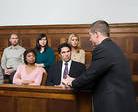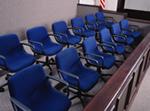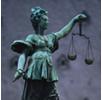Note!
There is currently a phone scam in our area claiming warrants have been issued for missed jury service. Law enforcement and court staff will NEVER call you to request money to settle a warrant. Law enforcement and court staff will NEVER call you asking for your social security number or other personal information. These scammers are using names of local judges and sheriff personnel in order to steal from people. If you receive one of these calls, please report it immediately to your local sheriff's office.
Glossary for Jurors
Common Words and Phrases
Beyond a reasonable doubt: Refers to the amount of proof required in a criminal case. Proof beyond a reasonable doubt is proof that leaves you firmly convinced of the defendant's guilt. The law does not require proof that overcomes every possible doubt. It is a higher standard than required in civil cases. Challenges: The law authorizes the judge and the lawyers to excuse individual jurors from service in a particular case for various reasons. If a lawyer wishes to have a juror excused, he or she must use a "challenge" for that juror. Challenges are of two kinds:
a. For cause - The law sets forth a number of reasons why jurors may be excused "for cause," that is, for a specified reason, such as bias or prejudice. For example, a juror who is related to or employed by one of the parties in the case may be excused for cause. There is no limit to the number of challenges for cause.
b. Peremptory - Each side in a case has a certain number of challenges that need not be supported by any reason, although a party may not use such a challenge in a way that discriminates against certain kinds of groups, such as a racial minority or one gender. These are called peremptory challenges. Each side may ask the judge to excuse a limited number of particular jurors. If a juror is excused, this does not imply something bad and does not mean the juror is not competent in any way. It frequently happens that a prospective juror will be excused in a certain case and be accepted in another at a later date. The number of peremptory challenges has been established by the legislature.
Civil case/civil suit: A case involving the law of civil or private rights. A lawsuit is called a civil case when it is between two or more individuals or corporations involved in a dispute and usually seeks a judgment awarding monetary damages.
Constitution: The fundamental law of our nation that establishes the conception, character, and organization of its sovereign power and the manner of its exercise. Also, the document that contains the guiding rules and principles, the descriptions of the power of the government, and the essential rights of the people of a country or state or other governing collective.
Controversy: A disagreement or a dispute that requires a definitive determination of how the law applies to the facts that are asserted to be true.
Counsel: One or more lawyers who represent a client.
Criminal prosecution/criminal case: A case in which the State prosecutes an individual for violating a criminal statute.
Degree of proof: The amount of proof necessary to prove a case. In a criminal case such proof must be beyond a reasonable doubt. In civil cases the standard is typically by a preponderance of the evidence. The court's instructions to the jury state the degree of proof necessary in a particular case.
Deliberations: When a jury goes into the jury room to think about and discuss evidence and testimony to reach a verdict in a civil or criminal case. The first task once in the jury room is to select a foreperson.
Directed verdict: After evidence has been presented and if no issue of fact remains for the jury to determine, the judge will determine, or "direct," the verdict.
Disqualification: The condition of being ineligible for jury service. A person is disqualified or ineligible for jury service if he or she is not a United States citizen; less than age 21; not a resident of the county or city of service unless serving in the county or city by order of the court; convicted of a felony unless restored to civil rights; unable to read, speak, and understand the English language; active military; a judge; or a person who the court or jury commissioners find incapable because of mental or physical illness (Sections 494.425, 494.505).
Eligible/eligibility and Ineligible/ineligibility: The condition of being qualified for jury service. A person is eligible for jury service if he or she is a United States citizen; at least age 21; a resident of the county or city, unless serving in another county by order of the court; not convicted of a felony unless restored to civil rights; and able to read, speak, and understand the English language.
Active military, judges, and persons who the court or jury commissioners find incapable because of mental or physical illness are ineligible to serve (Sections 494.425, 494.505).
Evidence: Any type of proof that is legally presented at trial through witnesses, records, and/or exhibits.
Excusals: By statute, certain eligible persons may be excused from jury service. On timely application to the court, the court shall excuse from jury service a person who (1) Is actually an employee of a religious institution whose religious obligations or constraints prohibit them serving on a jury (the certification of the employment and obligation or constraint may be provided by the employee's religious supervisor); (2) Has served on a jury within the preceding two years; and (3) Is a licensed health care worker, if such person can provide a written statement certifying that he or she is actually providing health care services to patients, and that the person's service as a juror would be detrimental to the health of the person's patients. On timely application and in the court's judgment, the court may excuse a person whose absence from work would materially and adversely affect public safety, health, welfare or interest; or a person on whom service would impose an extreme hardship (Section 494.430).
Exhibit: An exhibit is a document or material object produced and identified in court. It is usually, though not always, provided to introduce it as evidence in a case. Each document or object is ordinarily given an identifying letter or number in alphabetical or numerical sequence before it is used in court.
Felony: A serious crime usually punishable by imprisonment exceeding one year. Examples include murder, rape, arson, and burglary.
Foreperson: At the beginning of deliberations, the jury votes to select one of its members to be the foreperson. The jury foreperson's duty is to see that discussion during deliberations is carried on in a free and orderly manner, that the case and issues are fully and freely discussed, and that every juror is given a chance to participate in the discussion. As the deliberations conclude, the foreperson counts the votes and completes and signs the verdict form.
Impartial: Without bias or prejudice. The members of a jury should base their verdict on legal evidence presented during the trial.
Instruction: Guidelines that a judge gives the jury at the beginning and end of a trial that explain how the case will be conducted and what the jury must find to reach a verdict.
Jury panel/jury pool: The group of qualified, potential jurors that are summoned and may be chosen to serve as jurors in a trial.
Jury summons: The papers sent to potential jurors that require them to report for possible service on a jury.
Jury selection: The process by which jurors for a particular trial are selected from the larger group of potential jurors summoned to the courthouse. The first step in a trial is to select from the jury panel the number of jurors required to try the case. To do so, the lawyers or the judge may ask potential jurors questions. There are certain legal grounds for which a juror might be excused, called a challenge for cause, and each side may excuse a certain number of jurors, called a peremptory challenge. The challenges do not reflect on the jurors' integrity or intelligence. A sufficient number of those jurors who have not been excused are sworn to try the case on its merits or serve as alternates.
Litigants: Any persons or groups engaged in a lawsuit.
Marshal/Bailiff: An officer who maintains courtroom order and jury custody.
Pending: In process; not yet decided.
Plea: An accused person's formal response, such as "guilty" or "not guilty," to a criminal charge.
Polled/polling: Calling the names of the jurors and having them state or affirm their final verdict. This can be done individually or collectively.
Postpone: To put off until a later time. An individual who cannot serve as a juror at a particular time may apply to postpone the date of service. Upon receiving the application, the jury supervisor or board of jury commissioners, acting in accordance with written guidelines adopted by the circuit court, may postpone that juror's service to a later date (Section 494.415.3).
Preponderance of the evidence: Refers to the amount of proof typically required to win in a civil case. It is that degree of proof that is more probable than not, the greater weight of the evidence . It is a lower standard than that which is required in criminal cases.
Qualification Form/Questionnaire: A qualification form or questionnaire may be sent to citizens to determine if they are qualified to serve as a juror. A juror must respond to a qualification form within the time stated on the form. A person who fails to appear or respond may be guilty of civil contempt, enforceable by an order to show cause for the failure to comply and by a fine not to exceed $500.00. If you have any questions, contact the jury office of the court that summoned you at the telephone number on the documents you received (Sections 494.415, 494.450).
Sequestration: Isolation or segregation of a jury during trial. A sequestered jury usually stays together and cannot contact people outside the court. Sequestration rarely occurs and is meant for jurors' protection. It is used to keep the jurors away from the media or others that could improperly influence a juror's decision. The court will inform jurors if they will be sequestered.
Source list: The list or lists from which citizens are selected to receive a jury summons. Potential jurors are selected randomly from the voter registration list and the department of revenue's driver's license records and may include other lists such as the property tax rolls.
Subpoena: An official order to attend court at a stated time. The most common use of the subpoena is to summon witnesses to court for the purpose of testifying in a trial.
Testimony: Evidence given by a witness under oath.
Unable to serve: If you have health problems or other personal commitments that cannot be rescheduled at the time you are initially called, a postponement may be available. Contact your local jury office.
Unanimous: When all people on a jury agree on the verdict. In a criminal case, the verdict must be unanimous. In a civil case, only three-fourths of the jurors must agree on their verdict.
Verdict: The jury's finding or decision on the factual issues of a case. The verdict has to be in writing, signed by the foreperson, and reported to the court. It is read to the jury by the court clerk or the judge. In civil cases, each juror who agrees to the verdict signs it (Section 494.490).
Voir dire: Translated from the French, means 'to speak the truth.' With regard to juries, it is the questioning that occurs in jury selection to decide whether the potential jurors may serve on the jury.
Witness: One who can give a firsthand account of something seen, heard, or experienced.
 Boone Jury Reporting Instructions
Boone Jury Reporting Instructions
 Callaway Jury Reporting Instructions
Callaway Jury Reporting Instructions
 Contact
Contact
 Juror Basics
Juror Basics
 Frequently Asked Questions
Frequently Asked Questions
 Essential Readings
Essential Readings
 Glossary for Jurors
Glossary for Jurors
 Jury Statistics
Jury Statistics